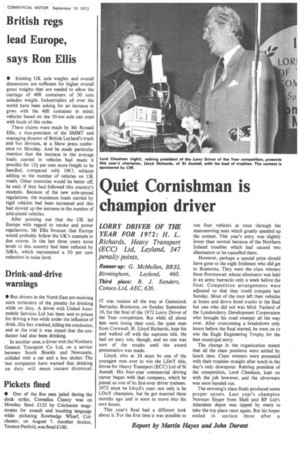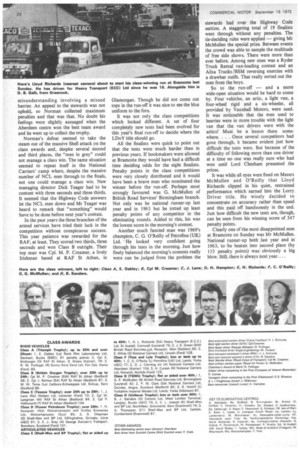uiet Cornishman is champion driver
Page 29

Page 30

If you've noticed an error in this article please click here to report it so we can fix it.
LORRY DRIVER OF THE YEAR FOR 1972: H. L. Richards, Heavy Transport (ECC) Ltd, Leyland, 347 penalty points.
Runner-up: G. McMullen, BRSL Birmingham, Leyland, 460. Third place: B. J. Sanders, Conoco Ltd, AEC, 626.
IT was tension all the way at Gamecock Barracks, Bramcote, on Sunday September 10, for the final of the 1972 Lorry Driver of the Year competition. But while all about him were losing their cool, the quiet man from Cornwall, H. Lloyd Richards, kept his and walked off with the supreme title. He had no easy win, though, and no one was sure of the results until the award presentation was made.
Lloyd, who at 24 must be one of the youngest men ever to win the LDoY title, drives for Heavy Transport (ECC) Ltd of St Austell. His four-year commercial driving career began with that company, which he joined as one of its first-ever driver trainees. 1972 must be Lloyd's year: not only is he LDoY champion, but he got married three months ago and is soon to move into his own house.
This year's final had a different look about it. For the first time it was possible to run four vehicles at once through the manoeuvring tests which greatly speeded up the contest. This year's entry was slightly lower than normal because of the Northern Ireland troubles which had caused two eliminators to be cancelled there.
However, perhaps a special prize should have gone to the eight Irishmen who did get to Bramcote. They were the class winners from Portstewart whose eliminator was held in an army barracks only a week before the final. Competition arrangements were adjusted so that they could compete last Sunday. Most of the men left their vehicles at home and drove hired trucks in the 'final but one who did not was Mick Fariand of the Londonderry Development Corporation who brought his road sweeper all the way over. After overcoming a breakdown only hours before the 'final started, he went on to win the Eagle Engineering Trophy for the best municipal entry.
The change in the organization meant that all the class positions were settled by lunch time. Class winners were presented with their trophies straight after lunch in the day's only downpour. Retiring president of the competition, Lord Chesham, kept on with the job however, and the silverware was soon handed out.
The morning's class finals produced some proper upsets. Last year's champion Norman Singer from Shell and BP Ltd's Aberdeen depot was tipped by many to take the top place once again. But his hopes ended in section three after a misunderstanding involving a missed barrier. An appeal to the stewards was not upheld, so Norman collected maximum penalties and that was that. No doubt his feelings were slightly assuaged when the Aberdeen centre won the best team award and he went up to collect the trophy.
Norman's defeat seemed to take the steam out of the massive Shell attack on the class awards and, despite several iecond and third places, the "men in grey" could not manage a class win. The same situation seemed to repeat itself in the National Carriers' camp where, despite the massive number of NCL men through to the finals, not one could manage a class win. New managing director Dick Teager had to be content with three seconds and three thirds. It seemed that the Highway Code answers let the NCL men down and Mr Teager was heard to remark that "something". would have to be done before next year's contest.
In the past years the three branches of the armed services have tried their luck in the competition without conspicuous success. This year patience was rewarded for the RAF, at least. They scored two thirds, three seconds and won Class B outright. Their top man was Cpl. M. P. Creamer, a lively Irishman based at RAF St Athan, in Glamorgan. Though he did not come out tops in the run-off it was nice to see the blue uniform to the fore.
It was not only the class competitions which looked different. A set of four completely new tests had been evolved for this year's final run-off to decide where the LDoY title should go.
All the finalists were quick to point out that the tests were much harder than in previous years. If bookmakers were allowed at Bramcote they would have had a difficult time deciding odds for the eight finalists. Penalty points in the class competitions were very closely distributed and it would have been a brave man who nominated the winner before the run-off. Perhaps most strongly favoured was G. McMullen of British Road Services' Birmingham branch. Not only was he national runner-up last year and in 1963 but he totted up least penalty points of any competitor in the eliminating rounds. Added to this, his was the lowest score in the morning's contest.
Another much fancied man was 1969's champion, C. G. O'Reilly of Petrofina (UK) Ltd. -He looked very confident going through his tests in the morning. Just how finely balanced the morning's contests really were can be judged from the problem the
stewards had over the Highway Code section. A staggering total of 19 finalists went through without any penalties. The tie-deciding rules were applied — giving Mr McMullen the special prize. Between events the crowd was able to sample the multitude of free side shows. There were more than ever before. Among new ones was a Ryder Truck Rental van-loading contest and an Ailsa Trucks /BSM reversing exercise with a drawbar outfit. That really sorted out the men from the boys.
So to the run-off — and a more wide-open situation would be hard to come by. Four vehicles, an artic, a light van, a four-wheel rigid and a six-wheeler, all provided by Vauxhall Motors, were used.
It was noticeable that the men used to heavies were in more trouble with the light van that the van drivers were with the artics! Must be a lesson there some where. . . Once several competitors had gone through, it became evident just how difficult the tests were. But because of the difficulty of following more than one driver at a time no one was really sure who had won until Lord Chesham presented the prizes.
It was while all eyes were fixed on Messrs McMullen and O'Reilly that Lloyd Richards slipped in his quiet, restrained performance which earned him the Lorry.
Driver title. He wisely decided to concentrate on accuracy rather than speed and this paid off handsomely in the end. Just how difficult the new tests are, though, can be seen from his winning score of 347 penalty points.
Clearly one of the most disappointed men at Bramcote on Sunday was Mr McMullen.
National runner-up both last year and in 1963, to be beaten into second place (by 113 penalty points) was I obviously a big blow. Still, there is always next year....
























































































































